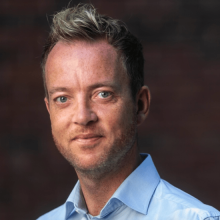
Esben Lunde Larsen is Director, Faith and Sustainability with World Resources Institute and the former Minister for Environment and Food for the country of Denmark, a position he held from February 2016 to May 2018. Prior to this appointment, he also served as the Minister for Higher Education and Science, the Spokesman on topics such as Education Grants, Higher Education, and research, and a member of the European Affairs Committee and the Environment Committee.
He first entered politics in 2006 as a member of the city council for the municipality of Ringkøbing-Skjern, and then became deputy mayor in 2009. He was elected to Parliament in 2011 for the Liberal Party in the Western Jutland greater constituency.
He holds a Master of Theology from the University of Copenhagen and an Industrial PhD from the University of Copenhagen and Grundtvigsk Forum.
“I’m proud to be part of the Champions initiatives effort to raise awareness on sustainable development goal 12.3 and the reduction of global food loss and food waste in 2030. Food loss and waste is a huge challenge for global food security, human livelihoods and the conservation of the environment that calls for global responses and individual action. And Denmark is ready to take its share and to engage in a new solution based global partnership. One of the initiatives we have launched in Denmark is a national partnership for reduction of avoidable food waste, which will foster voluntary and binding collaboration between all links in the food chain and relevant authorities and organizations, as solutions and barriers should be addressed across all stakeholders.” — Esben Lunde Larsen
Denmark’s Work to Reduce Food Loss and Waste
Prevention of food waste has been a strategic focus point at the national level in Denmark since 2010 and comprises of: the National Waste Prevention Strategy; prioritization and funding of research; ongoing dialogue with the food sector, trade organisations, and consumers; and international engagement within the Nordic countries, EU, and International Organizations.
The total amount of avoidable food waste in Denmark has been estimated at 720,000 tons per year. The households generate 260,000 tons per year and the entire service sector (trade and food service) generate 228,000 tons per year (data from 2011-13).
Recent initiatives include:
• The International Food Summit “Better Food for More People” in August 2016 with 100 international policy decision-makers, industry leaders, experts and gastronomy frontrunners to identify steps on how to ensure better food for more people, including how to prevent food waste.
• The “Green Development and Demonstration Program” and “Eco-Innovation Program” support innovative green solutions by businesses and research institutions to prevent food waste – for example by developing packaging solutions to prolong freshness of fruit and vegetables.
• Removal of legislative burdens in order to decrease food waste, including changes in taxation and changes that remove limitations in donations from food retailers.
• A “partnership for prevention of avoidable food waste” between businesses, organizations and authorities (29 partners in total). The partners share information and experiences, identify barriers in existing legislation, develop new ideas and co-operate to initiate new initiatives to prevent food waste.
• Support to initiatives from the entire food value chain through the “subsidy scheme for less food waste 2016-17.” 13 projects were initiated in 2016, for example projects raising awareness at consumer level, donation of surplus food, workshops at high schools, and new business models for marketing of second quality vegetables.
• The “Food Waste Hunters Initiative,” a task force of consultants who engage commercial kitchens in the food service sector to finding food waste reduction opportunities.
• A yearly national “Conference on Less Food Waste” in order to gather and inspire all actors in the entire food value chain to take actions.
• Teaching materials that provide children with practical tools and teach them the difference between ‘use by’ date and ‘best before’ as well as tips on how to store food so it does not go bad.
• A scientific approach on the complex challenges concerning prevention of food waste including monitoring of food waste. As a consequence of this the Ministry collaborates with several universities in order to generate knowledge on the extent of food waste, incentives and powerful instruments in order to procure feasible, sustainable and holistic solutions.
Prevention of food waste is for everybody to engage in. The Danish Ministry of Environment and Food therefore highly prioritizes a continuous dialog with all stakeholders throughout the entire food chain in order to ensure awareness, facilitation and progress.
